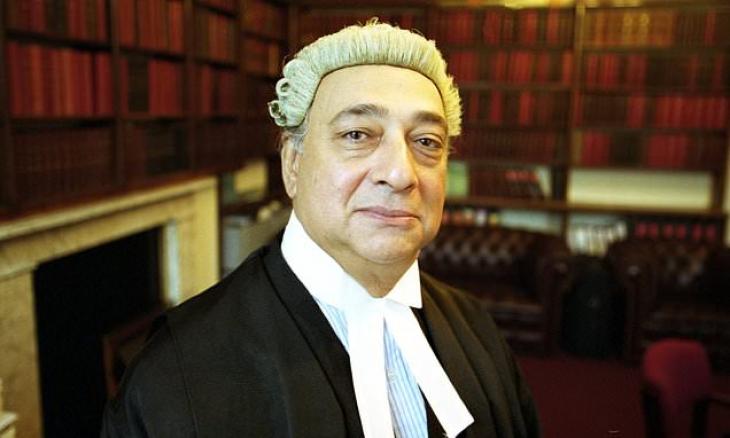
By Publisher Ray Carmen
Few lives have bridged the realms of justice, diplomacy, aristocracy, and Caribbean warmth as effortlessly as that of Sir George Desmond Lorenz de Silva QC PC. Internationally celebrated for his unwavering commitment to justice, Sir Desmond’s journey began in Kandy, Ceylon (modern-day Sri Lanka), and took him across the globe—from the courtrooms of London to the Caribbean shores he came to love.
A Legal Heritage Rooted in Honour
Born on 13 December 1939 into a family steeped in law and politics, Sir Desmond was destined for greatness. His father, Fredrick de Silva MBE, was a diplomat and ambassador for Ceylon, and his grandfather, George E. de Silva, was a pivotal figure in the independence movement and served on the Ceylon War Council during World War II.
Educated at Trinity College, Kandy, and later at Dulwich College Preparatory School, Sir Desmond read law at the Middle Temple in London. Called to the Bar in 1964, he swiftly rose through the ranks, becoming Queen’s Counsel in 1984.
At the height of his legal career, he served as Head of Chambers at No. 2 Paper Buildings, an esteemed barristers’ set once home to none other than Lord Ivor Richard, former head of the House of Lords. This role further affirmed Sir Desmond’s stature as one of the UK’s most respected legal minds.

The Finucane Review: Seeking Truth in State Accountability
In October 2011, Sir Desmond de Silva QC was appointed by the Secretary of State for Northern Ireland to conduct an independent review into allegations of state involvement in the 1989 murder of Belfast solicitor Patrick Finucane. His appointment reflected the government’s trust in his impartiality and international legal acumen. The findings of his detailed investigation were published on 12 December 2012. In response, the UK Government pledged to study his report thoroughly to determine whether further lessons could be drawn. A joint report—compiled by the Cabinet Secretary, the Secretary of State for Defence, and the Secretary of State for Northern Ireland—was later published on gov.uk and placed in the House of Commons Library, underscoring the national significance and enduring impact of Sir Desmond’s work in promoting transparency and accountability in matters of state.

Justice Without Borders
Sir Desmond became a symbol of justice on the world stage. Appointed Chief Prosecutor for the UN-backed Special Court for Sierra Leone in 2005, he led the historic prosecution of Charles Taylor, the former Liberian President, for war crimes and crimes against humanity—an unprecedented milestone in international law.
He also advised on international inquiries and led major human rights investigations, earning a reputation as a relentless advocate for the voiceless.

A Stellar Clientele

Beyond his international legal work, Sir Desmond was renowned for representing a diverse and high-profile clientele. His clients included:
-
John Terry, England footballer, acquitted of charges relating to a nightclub fracas in 2002.
-
Lawrence Dallaglio, former England rugby player.
-
Harry Redknapp and Ron Atkinson, prominent football managers.
-
Hans Segers, Wimbledon goalkeeper, successfully defended in a football corruption and match-fixing trial.
-
Lee Bowyer, Leeds United midfielder, tried for grievous bodily harm.
-
Jacqui Oliver, leading female jockey, tried for fraud.
-
Dame Shirley Bassey, celebrated singer.
-
Buzz Aldrin, astronaut and second man to walk on the moon.
-
Lord Brocket, polo-playing friend of Prince Charles, in a £4.5m car insurance fraud case.
-
Roger Levitt, involved in a City fraud trial.
-
Margaret Thatcher, advised during legal issues involving her son.
-
Raila Odinga, journalist and future Prime Minister of Kenya, whose life he helped save.
A Deep Connection to the Caribbean
Despite his global responsibilities, Sir Desmond nurtured a profound affection for the Caribbean. Alongside his wife, Princess Katarina of Yugoslavia, he visited the region often, staying with close friends including the former Governor of the U.S. Virgin Islands.
The couple found joy and peace in the islands’ culture and hospitality. Sir Desmond often spoke of the Caribbean with admiration and warmth—he felt a kinship with its history, rhythm, and spirit. For a man so often immersed in global conflict resolution, the islands represented harmony and humanity at their finest.
An Aristocratic Union

In 1987, Sir Desmond married Princess Katarina, a great-niece of Prince Philip, Duke of Edinburgh. Their union brought together two noble lineages and symbolized a life lived across the intersections of diplomacy, duty, and dignity.

His distinguished family home in Kandy was once visited by wartime commander , Lord Louis Mountbatten, who was King Charles’ Great uncle, based in Ceylon during WWII. Their historic residence, known to host film stars and dignitaries alike, was a hub of culture and conversation—a setting that greatly influenced young Desmond’s worldly view.

A Timeless Legacy
Knighted in 2007 for his services to international law and human rights, Sir Desmond de Silva QC PC was appointed to the Privy Council of the United Kingdom in 2011, reflecting his esteemed position within the British legal system. His name stands alongside those who used law not as a shield of the privileged, but as a sword for the oppressed.
As Princess Katarina graces the cover of this edition of Caribbean World Travel & Living, we pay tribute to a man who carried the weight of justice with the grace of nobility—and who always held a place in his heart for the Caribbean and its people.
Sir Desmond De Silva was a friend whom I had known for quite a few years .




